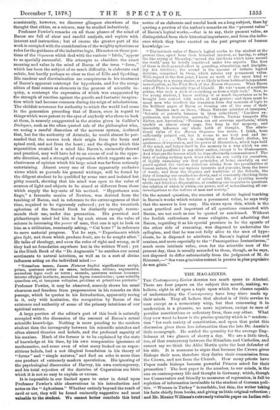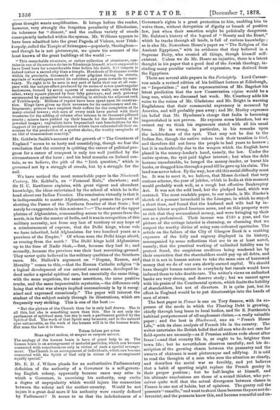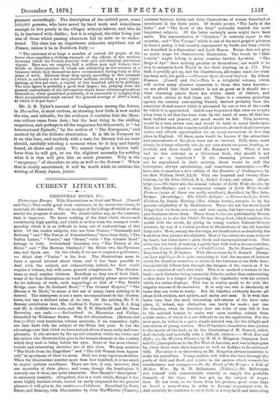TILE MAGAZINES.
THE Contemporary Review devotes too much space to Alcohol. There are four papers on the subject this month, making, we believe, eight in all upon a topic upon which the classes capable of understanding the Contemporary have long since made up their minds. They all believe that alcohol is of little service to man except as a momentary whip, but that consuming it in moderation is a pleasure, no more injurious, except to men of peculiar constitutions or sedentary lives, than any other. What they now want to know is the precise quantity which is " modera- tion " for each variety of constitution, and upon that point this discussion gives them less information than the late Dr. Anstie's little monograph. He settled the quantity for the average Eng- lishman at two glasses of sherry a day. We are a little tired, too, of that controversy between the Ritualists and Catholics, and cannot say we think the Abbe Martin quite the best defender of his side. It is nonsense to argue that because the Crown gives Bishops their sees, therefore they derive their commission from the Crown, and not from the Church. How many priests have Popes made bishops because powerful Princes asked for their promotion ? The best paper in the number, to our minds, is the one on contemporary life and thought in Germany, which, though too Conservative and friendly to measures of repression, is full to repletion of information invaluable to the student of German poli- tics. " Woman in Turkey " is readable, but thin, the writer taking his facts chiefly from books, and giving us little original reflection ; and Mr. Monier Williams's extremely valuable paper on Indian reli- gious thought wants amplification. It brings before the reader, however, very strongly the forgotten peculiarity of Hindooism, its tolerance for " dissent," and the endless variety of creeds consequently included within the system. Mr. Williams appears to have been admitted into the great Pagoda of Vishnu, near Trich- iaopoly, called the Temple of Srirangam—popularly, Sheringham- and though he is not picturesque, we quote his account of the least known of the great buildings of the world :- "This remarkable structure, or rather collection of structures, con- tains in one of its courts a shrine to Ramtiouja himself, who is supposed to have lived here for a considerable time before his death. Stri-rangam is indeed rather a eacred city than a temple. Hundreds of Briihmana reside within its precincts, thousands of pious pilgrims throng its streets, myriads of worshippers crowd its corridors, and press towards its sanc- tuary. No sight is to be seen in any part of India that oan at all com- pare with the unique effect produced by its series of seven quadrangular enclosures, formed by seven squares of massive walls, one within the other, every square pierced by four lofty gateways, and each gateway surmounted by pyramidal towers, rivalling in altitude the adjacent rock of Trichinopoly. Millions of rupees have been spent upon its construc- tion. Kings have given np their revenues for its maintenance and en- largement; princes have emptied their coffers for the completion of its many-storied towers ; rich men of every rank have parted with their treasures for the adding of column after column to its thousand-pillared courts ; misers have yielded up their hoards for the decoration of its jewelled images; capitalists have bequeathed vast benefactions for the support of its priests ; architects and artists have exhausted all their re- sources for the production of a perfect shrine, the worthy receptacle of an idol of transcendent sanctity."
Mr. Goldwin Smith's account of the growth of " The Greatness of England " seems to us hasty and unsatisfying, though we fear the conclusion that the country is quitting the career of political pro- gress for a career of conquest is only too well justified by the circumstances of the hour ; and his brief remarks on Ireland con- tain, as we believe, the pith of the " Irish question," which is governed not by a struggle of creeds, but by a struggle for the soil.
We have noticed the most remarkable paper in the Nineteenth Century, Mr. Kebbel's, on " Personal Rule," elsewhere ; and Sir H. C. Rawlinson explains, with great vigour and abundant knowledge, the ideas entertained by the school of which he is the head about our Indian Frontier. His conclusion virtually is that it is indispensable to master Afghanistan, and possess the power of shutting the Passes of the Northern frontier of that State ; but surely he exaggerates in this sentence ?—" The master of the upper plateau of Afghanistan, commanding access to the passes from the north, is in fact the master of India, and itwas in recognition of this military necessity, not from any lust of territory or any hope of a reimbursement of expense, that the Delhi kings, whose rule we have inherited, held Afghanistan for two hundred years as a province of the Empire." Of whom were the Delhi kings afraid, as coming from the north ? The Delhi kings held Afghanistan up to the time of Nadir Shah,—first, because they had it ; and secondly, because the province was their best recruiting-ground. They never quite believed in the military qualities of the Southern races. Mr. Mallock's argument on "Dogma, Reason, and Morality" comes to this, —that the Roman Catholic religion "is a logical development of our natural moral sense, developed in- deed under a special spiritual care, but essentially the same thing, with the same negations, the same assertions, the same positive truths, and the same impenetrable mysteries,—the difference only being that what was always implied unconsciously is by it recog- nised and expressed consciously." The paper will interest the student of the subject mainly through its illustrations, which are frequently very striking. This is one of the beat :—
" But the picture of the Church thus far is only half drawn. She is all this, but she is something more than this. She is not only the parliament of spiritual man, but she is such a parliament guided by the Spirit of God. The work of that Spirit may be secret, and to the natural eyes untraceable, as the work of the human will is in the human brain. tHut none the less it is there.
Totem infuse per artus Mena agitat molem, et magno se corpora miscet.
The analogy of the human brain is hero of great help to us. The human brain is an arrangement of material particles, which can become connected with consciousness only in virtue of such a special arrange- ment. The Church is an arrangement of individuals, which can become connected with the Spirit of Lied only in virtue of an arrangement squally special."
Mr. E. D. J. Wilson pleads for an authoritative Parliamentary definition of the authority of a Governor in a self-govern- ing English colony, apparently because cases may arise in which a Governor, in exercising his authority, may excite a degree of unpopularity which would injure the connection between the colony and the mother-country. Would he not injure it a great deal more if his authority were exactly defined by Parliament? It seems to us that the indefiniteness of a Governor's rights is a great protection to him, enabling him to waive them, without derogation of dignity or breach of positive law, just when their assertion might be politically dangerous. Mr. Ralston's history of the legend of " Beauty and the Beast," which he tracks through all lands, is full of curious knowledge ; as is also Mr. Newenham Hoare's paper on " The Religion of the Ancient Egyptians," with its evidence that they believed in a Supreme Deity, who created all things, though himself self- existent. Unless we do Mr. Hoare an injustice, there is a latent thought in his paper that a good deal of the Jewish theology, in- cluding many peculiar varieties of expression, was derived from the Egyptians.
There are several able papers in the Fortnightly. Lord Carnar- von sends a revised edition of his brilliant lecture at Edinburgh, on " Imperialism ;" and the representatives of Mr. Bagehot his latest prediction that the new Conservative regime would be a long one, which we discussed last week. Mr. Courtney adds his voice to the voices of Mr. Gladstone and Mr. Bright in warning Englishmen that their commercial supremacy is menaced by America, and will probably pass away ; and Mr. Morley expresses his belief that Mr. Hyndman's charge that India is becoming impoverished is not proven. He exposes some blunders, but we cannot say we think his arguments stated with all his usual force. He is wrong, in particular, in his remarks upon the indebtedness of the ryot. That may not be due to the Indian fist, though the native rulers took their taxation in kind, and therefore did not force the people in bad years to borrow ; but it is undoubtedly due to the weapon which the English have placed in the money-lender's hand, namely, the law. Under the native system, the ryot paid higher interest ; but when the debt became unendurable, he hanged the money-lender, or burnt his books, or dragged him through a pond till be gave up his claim. The land was never taken. By the way, how old this social difficulty must be. It was to meet it, we believe, that Moses devised that very curious scheme, the year of jubilee, which in India at this moment would probably work well, as a rough but effective Bankruptcy Act. It was not the sold land, but the pledged land, which was restored. The most readable paper, to our minds, is Mr. Zineke's sketch of a peasant household in the Limagne, in which he stayed a short time, and found that the husband and wife bad by in- cessant labour acquired fourteen acres, and on this property were so rich that they accumulated money, and were bringing up their son as a professional. Their income was £140 a year, and the picture of the cottage interior is charming, so charming that we suspect the worthy divine of using rose-coloured spectacles. The article on the failure of the City of Glasgow Bank is a scathing exposure of the folly and roguery displayed in its history, accompanied by some reflections that are to us at least novel, namely, that the practical working of unlimited liability was to protect fraud, the suspicious creditors being rendered lax by their conviction that the shareholders could pay up all debts, and that it is not in human nature to take the same care of borrowed money that we do of our own slowly-earned capital. We should have thought human nature in everybody but rascals would have induced them to take double care. The writer's views on unlimited banks are very strong, and deserve study ; but we cannot agree with his praise of the Continental system, which limits the liability of shareholders, but not of directors. It is quite just, but its effect in England would be to put directorships into the hands of men of straw.
The best paper in Fraser is one on Tory finance, with its ex• posure of the mode in which the Floating Debt is growing, chiefly through long loans to local bodies, and Sir S. Northcote's habitual postponement of all unpleasant claims,—a really valuable paper ; and the best in Blackwood, one on " French Home Life," with its close analysis of French life in the country. The writer entertains the British belief that all men who do not care for field-sports are unmanly—as if Prussian soldiers rode about after foxes !—and that country life is, or ought to be, brighter than town life ; but he nevertheless observes carefully, and his de- scription of the growing chasm between the peasantry and the owners of chateaux is most picturesque and edifying. It is odd to read the thoughts of a man who sees the situation so clearly, and describes the social war so forcibly, and yet believes that a habit of sporting might replace the French gentry in their proper position ; but he half-laughs at himself, and his ultimate conclusions are those of a sound thinker, who per- ceives quite well that the actual divergence between classes in France is one not of habits, but of opinions. The gentry call the peasants " canaille," and want to shoot them because theyare not de- ferential; and the peasants know this, and become resentful and un-
pleasant accordingly. The description of the retired poor, some 600,000 persons, who have saved by hard work and miserliness enough to live poorly in the villages without labour, and who do it, is tinctured with dislike ; but it is original, the class being just one of those which passing observers fail to note or to under- stand. The class has an importance unknown anywhere out of France, unless it be in Northern Italy :- " The existence of so large a number of retired old people of the lower class supplies a striking example of the effects of the resolute economy which the French practise with such self-denying', persistent vigour. Here are, we suppose, half a million men and women, two- thirds or three-quarters of whom are subsisting on the revenue of a treasure which they themselves have accumulated during forty or fifty years of work. Between them they spend, according to this estimate (which is certainly a low one), twelve millions sterling a year, repre- senting, at five per cent., a capital of two hundred and forty millions. The true figure is probably a good deal larger; for, judging from the general concordance of the information which these veterans give about themselves, when questioned prudently, it is reasonable to imagine that their accumulations must exceed the general average of £480 a head, at which it is put here."
Mr. E. B. Tylor's account of backgammon among the Aztecs, in Macmillan, is most curious, as showing how little is new under the sun, and valuable, for the evidence it contains that the Mexi- can culture came from Asia ; but the best thing in the shilling magazines, and perhaps in all the magazines for this month, is " An International Episode," by the author of " The Europeans," and marked by all his delicate observation. It is life in Newport he is on this time, and anybody with a taste for literary vol-au-vent should, carefully selecting a moment when he is lazy and faintly bored, sit down and enjoy. We cannot imagine a better half- hour than he will get, or see the slightest necessity for settling what it is that will give him so much pleasure. Why is the " croquancy " of chocolate so nice as well as the flavour ? When that is clearly ascertained, it will be worth while to criticise the writing of Henry James, junior.








































 Previous page
Previous page